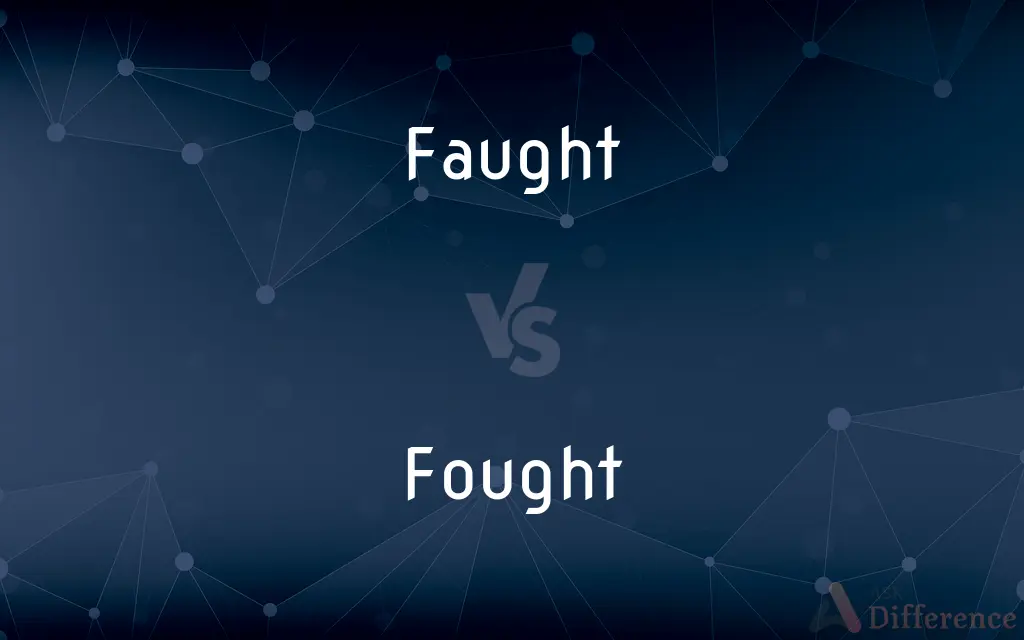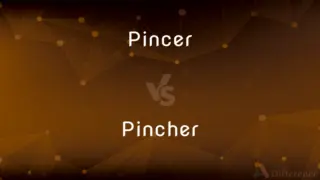Faught vs. Fought — Which is Correct Spelling?
Edited by Tayyaba Rehman — By Fiza Rafique — Updated on March 19, 2024
"Faught" is incorrect, while "Fought" is the correct spelling, denoting the past tense of the verb "fight," which means to engage in combat or struggle.

Table of Contents
Which is correct: Faught or Fought
How to spell Fought?

Faught
Incorrect Spelling

Fought
Correct Spelling
ADVERTISEMENT
Key Differences
Remember "Fought" by noting that “fight” and “fought” both have “ght”.
Picture a knight (knight and fought both contain "ght") in battle when visualizing "fought".
Alternatively, associate "fought" with popular phrases or idioms, such as "fought tooth and nail" to help ingrain the correct spelling.
Furthermore, using the word repetitively in writing or speech could cement its correct form in your memory.
Think of other words with similar structures, like "brought" or "thought", to help you remember the correct spelling.
ADVERTISEMENT
How Do You Spell Fought Correctly?
Incorrect: He faught to keep his business open.
Correct: He fought to keep his business open.
Incorrect: They have faught over this issue for months.
Correct: They have fought over this issue for months.
Incorrect: The two sides faught fiercely for control.
Correct: The two sides fought fiercely for control.
Incorrect: He faught bravely in the battle.
Correct: He fought bravely in the battle.
Incorrect: She faught against the injustice.
Correct: She fought against the injustice.
Fought Definitions
Contended in any manner.
They fought over the inheritance.
Participated in a struggle.
He fought for justice.
Struggled against something.
She fought the illness.
Exerted oneself.
She fought to stay awake.
Engaged in combat.
They fought bravely.
Past tense and past participle of fight.
Simple past tense and past participle of fight
Fought Meaning in a Sentence
They fought against the wind during the storm.
The soldiers fought with courage.
He fought for his rights.
The team fought to the last second of the game.
The children fought over the last piece of cake.
They fought through the difficulties together.
She fought hard to win the competition.
He fought off the attackers and escaped.
The firefighters fought the blaze for hours.
She fought back tears while saying goodbye.
He fought to overcome his fears.
She fought against the disease with all her strength.
They fought for equality and justice.
He fought to clear his name.
The athletes fought for a spot on the team.
He fought against the urge to give up.
The soldiers fought bravely, despite being outnumbered.
The boxer fought for the championship title.
The villagers fought to protect their land.
They fought hard to keep their traditions alive.
She fought for a better future for her children.
They fought for every inch of ground.
She fought her way through the crowd.
The couple fought and then made up.
The lawyer fought to defend his client.
Fought Idioms & Phrases
Fought tooth and nail
To fight or resist very fiercely or with all one's effort.
She fought tooth and nail to get the project approved.
Common Curiosities
What is the verb form of Fought?
Fought is the past tense and past participle of the verb “fight.”
What is the root word of Fought?
The root word is the Old English “feohtan.”
Which vowel is used before Fought?
Typically, "u" as in "I just fought."
Which preposition is used with Fought?
“Against” as in "fought against."
What is the pronunciation of Fought?
Fought is pronounced /fɔt/.
What is the plural form of Fought?
Fought (as it remains unchanged in plural contexts).
Which conjunction is used with Fought?
Varies; “and” can be used, e.g., "fought and won."
Why is it called Fought?
"Fought" derives from the Old English “feohtan,” which means to fight.
Is Fought an adverb?
No, Fought is not an adverb.
Is Fought a collective noun?
No, Fought is a verb.
What is the singular form of Fought?
Fought (it does not have a singular/plural distinction).
Is Fought a vowel or consonant?
Fought is a word, not a letter.
What is a stressed syllable in Fought?
The entire word “Fought” is stressed as it’s one syllable.
Is Fought a countable noun?
No, Fought is a verb.
Is the word “Fought” a Direct object or an Indirect object?
Neither; it is a verb.
How do we divide Fought into syllables?
Fought is one syllable and is not divided.
Which determiner is used with Fought?
Can vary; “the” can be used: "the fought battle."
What is the second form of Fought?
Fought.
Which article is used with Fought?
“The” as in "the fought battle."
Is Fought an abstract noun?
No, Fought is not a noun.
Is Fought a negative or positive word?
Neutral; context determines positive or negative connotation.
Is the word Fought is imperative?
No, Fought is past tense.
How many syllables are in Fought?
One syllable.
What is the first form of Fought?
Fight.
What is the third form of Fought?
Fought.
How is Fought used in a sentence?
"They fought valiantly despite being outnumbered."
Is Fought a noun or adjective?
Fought is a verb.
Is the Fought term a metaphor?
It can be used metaphorically, e.g., "fought a battle within."
Is the word Fought is Gerund?
No, “Fighting” is the gerund form.
What part of speech is Fought?
Verb.
What is another term for Fought?
Battled.
What is the opposite of Fought?
Surrendered.
Share Your Discovery

Previous Comparison
Lept vs. Leapt
Next Comparison
Pincer vs. PincherAuthor Spotlight
Written by
Fiza RafiqueFiza Rafique is a skilled content writer at AskDifference.com, where she meticulously refines and enhances written pieces. Drawing from her vast editorial expertise, Fiza ensures clarity, accuracy, and precision in every article. Passionate about language, she continually seeks to elevate the quality of content for readers worldwide.
Edited by
Tayyaba RehmanTayyaba Rehman is a distinguished writer, currently serving as a primary contributor to askdifference.com. As a researcher in semantics and etymology, Tayyaba's passion for the complexity of languages and their distinctions has found a perfect home on the platform. Tayyaba delves into the intricacies of language, distinguishing between commonly confused words and phrases, thereby providing clarity for readers worldwide.














































